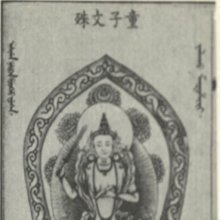Kumarabhuta, Kumārabhūta, Kumara-bhuta: 2 definitions
Introduction:
Kumarabhuta means something in Buddhism, Pali, Hinduism, Sanskrit. If you want to know the exact meaning, history, etymology or English translation of this term then check out the descriptions on this page. Add your comment or reference to a book if you want to contribute to this summary article.
Images (photo gallery)
In Buddhism
Mahayana (major branch of Buddhism)
Source: Wisdom Library: Maha Prajnaparamita SastraKumārabhūta (कुमारभूत) refers to “crown prince” (of the Dharma) and represents one of the ten Bodhisattva vyavasthānas, according to the Avataṃsaka in the chapter on the bodhisattva-daśavyavasthāna, as mentioned in the 2nd century Mahāprajñāpāramitāśāstra chapter 52. Kumārabhūta-vyavasthāna is also known as t’ong tchen. The Sanskrit names of these ten abodes are given by the Gaṇḍhavyūha.

Mahayana (महायान, mahāyāna) is a major branch of Buddhism focusing on the path of a Bodhisattva (spiritual aspirants/ enlightened beings). Extant literature is vast and primarely composed in the Sanskrit language. There are many sūtras of which some of the earliest are the various Prajñāpāramitā sūtras.
Languages of India and abroad
Sanskrit dictionary
Source: Cologne Digital Sanskrit Dictionaries: Edgerton Buddhist Hybrid Sanskrit DictionaryKumārabhūta (कुमारभूत).—adj., while still a youth; remaining a youth; a stock epithet of Mañjuśrī, q.v., who is perenni- ally young: Saddharmapuṇḍarīka 7.8—9; 260.16; 275.1 ff.; Mahāvyutpatti 650; but also of others, especially Bodhisattvas, Mahāvyutpatti 693—5, 698—9, and compare 883 te ca bodhisattvā…bhūyastvena sarve kumāra- bhūtāḥ; also of Buddhas, with reference to the period before their enlightenment, Saddharmapuṇḍarīka 19.2; 160.9; 311.2 (here of Śākyamuni); and even of an ordinary human being, Jīvaka, Divyāvadāna 270.12, 20; 506.8 ff.; but this is probably based on a misunderstanding and consequent re-formation of next, q.v.
Sanskrit, also spelled संस्कृतम् (saṃskṛtam), is an ancient language of India commonly seen as the grandmother of the Indo-European language family (even English!). Closely allied with Prakrit and Pali, Sanskrit is more exhaustive in both grammar and terms and has the most extensive collection of literature in the world, greatly surpassing its sister-languages Greek and Latin.
See also (Relevant definitions)
Partial matches: Kumara, Bhuta.
Ends with: Durdharshakumarabhuta, Merushikharadharakumarabhuta.
Full-text: Varunamati, Merushikharadharakumarabhuta, Jyotishmati, Merushikharadhara, Durdharsha, Durdharshakumarabhuta, Sumati, Jivaka, Manjushri, Vyavasthana.
Relevant text
Search found 5 books and stories containing Kumarabhuta, Kumārabhūta, Kumara-bhuta, Kumāra-bhūta; (plurals include: Kumarabhutas, Kumārabhūtas, bhutas, bhūtas). You can also click to the full overview containing English textual excerpts. Below are direct links for the most relevant articles:
Maha Prajnaparamita Sastra (by Gelongma Karma Migme Chödrön)
Act 10.9: The transformed Sahā universe compared with the Padmāvatī universe < [Chapter XV - The Arrival of the Bodhisattvas of the Ten Directions]
Act 9.5: Samantaraśmi offers to pay homage to Buddha Śākyamuni < [Chapter XV - The Arrival of the Bodhisattvas of the Ten Directions]
Note (2). The ten Bodhisattva grounds or abodes < [Chapter XX - (2nd series): Setting out on the Mahāyāna]
Vinaya Pitaka (3): Khandhaka (by I. B. Horner)
The story of Jīvaka < [8. Robes (Cīvara)]
The Fo-Sho-Hing-Tsan-King (A Life of Buddha) (by Samuel Beal)
Varga 20. Receiving the Jetavana Vihāra < [Kiouen IV]
Reverberations of Dharmakirti’s Philosophy (by Birgit Kellner)
A Dictionary Of Chinese Buddhist Terms (by William Edward Soothill)
Related products
